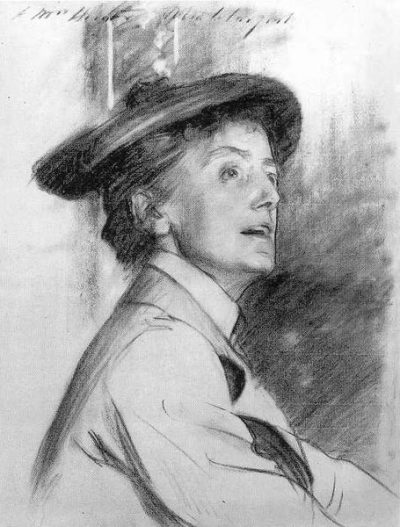Born in London, April 22, 1858
Died in Woking, May 8, 1944
Name Pronunciation
There is no consensus.
This article (2018) claims that Smyth’s family pronounced the name “Smith,” not “Smythe”
This dissertation (see p. 136) discusses Peter Avis’s theory that it should be pronounced with a long “i” and an unvoiced “th,” like “Forsyth.”
- This account also says that Smyth’s friend Sir Thomas Beecham was no use as a source on this issue because he always called her Dame Ethel. (That’s a brilliant way to stay out of the controversy.)
In her autobiography Streaks of Life, Ethel Smyth tells a humorous story in which she seems surprised that a woman pronounces her name to “rhyme with ‘scythe.’”

Biography
- Smyth studied music at the Leipzig Conservatory, and privately in Leipzig. Her associates during her time living in Leipzig included Clara Schumann and Johannes Brahms.
- Smyth was particularly interested in opera. She composed six, including The Wreckers (composed 1902-4).
- In 1910-1912, Smyth was romantically involved with suffragist Emmeline Pankhurst, and she became deeply involved in the women’s suffrage movement, including composing the suffrage anthem March of the Women.
- Smyth was also a prolific and popular writer, and the author of two memoirs.
- From the 1920s onward, Smyth received broader recognition for her work, including being made a Dame of the British Empire. She used her late-career celebrity to support the careers of women in music: for example, she lobbied for women to be hired in professional British orchestras.1
Biography from Exploring Surrey’s Past
- Also includes biographical timeline, works list, and access to the The Lewis Orchard Collection at Surrey History Centre.
Sources
- Sophie Fuller, “Smyth, Dame Ethel,” Grove Music Online (2001), accessed July 7, 2021, https://www.oxfordmusiconline.com/grovemusic/view/10.1093/gmo/9781561592630.001.0001/omo-9781561592630-e-0000026038.

